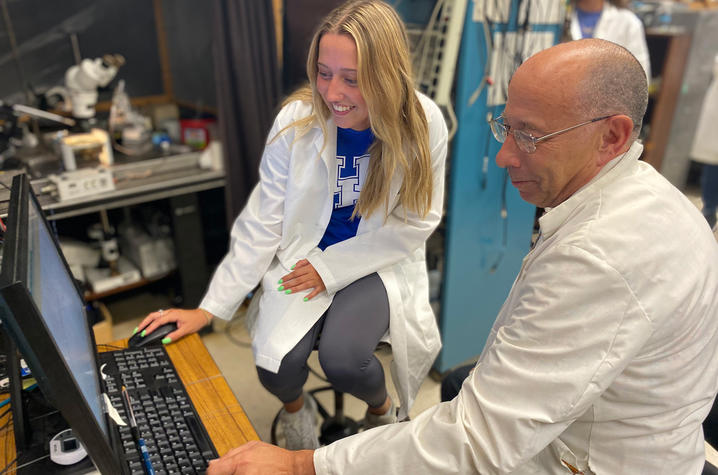Advancing undergraduate research through the Chellgren Endowed Professorship: Robin Cooper

Throughout his career, Robin Cooper, Ph.D., has always been guided by curiosity. As a comparative physiologist in the Department of Biology in the University of Kentucky College of Arts and Sciences, he has spent decades asking questions about how living systems work and encouraging students to ask their own.
The Chellgren Endowed Professorship gave Cooper the runway to amplify that spirit of inquiry, transforming his classroom and lab into even more powerful spaces where undergraduates could test ideas, take intellectual risks and share their discoveries on the national stage.
Part of the Chellgren Center for Undergraduate Excellence, Chellgren Endowed Professors are selected for a three-year, nonrenewable term that recognizes and supports faculty who shape the undergraduate experience at UK through teaching, research and program innovation. The professorship encourages initiatives that raise student aspirations, foster curricular creativity and strengthen collaboration across disciplines.
For Cooper, the appointment provided a platform to expand his teaching and open more doors for student research. He developed a small-cohort seminar that invited Chellgren Fellow students to wrestle with questions at the intersection of science and society, examining not only the methods of scientific discovery, but also its impact on culture and ethics. At the same time, he dedicated the bulk of his funding to undergraduate research in his lab. With Chellgren Center support, Cooper was able to bring more students into his lab than ever before — covering supplies, supporting travel to conferences and launching projects that once seemed out of reach.
Impact on students
Cooper’s lab explores modulation of synaptic transmission and behavior using invertebrate models such as crayfish and Drosophila, a type of fruit fly. More recently, his team examined receptor subtypes that influence the larval Drosophila heart. Undergraduates have been central to each of these efforts, contributing to projects that might otherwise never have been possible.
“The ability to include more undergraduates increased research exposure and confidence,” Cooper said. “Presenting at local, national and international meetings gave students invaluable experience and a sense of belonging in the field.”
The results are extraordinary. Cooper’s group has published more than 200 papers, with undergraduates serving as first or co-authors on more than 60 of them. Collectively, his students have presented hundreds of abstracts, a testament to the culture of discovery he has built in the classroom and the lab. For Cooper, seeing students step into the role of researcher is at the heart of UK’s mission — preparing graduates who leave not just with knowledge, but with the confidence to contribute new knowledge.
Beyond the classroom
The professorship also emboldened Cooper to experiment with new directions. That freedom, he said, was one of the greatest gifts of the appointment: the ability to chase a new question, try an unconventional idea and discover that those risks often led to the most fruitful collaborations with students. Projects he might once have set aside as “too tangential” became productive avenues of inquiry, leading to publications co-authored with undergraduates.
His commitment to cultivating curiosity has extended well beyond UK’s campus. Cooper has served as president of the Kentucky Academy of Science, directed a large ISEF-affiliated science fair and mentored high school researchers who went on to earn international recognition. He has also partnered with middle and high school educators to spark enthusiasm for STEM among the next generation of scholars.
Advice for future Chellgren Endowed Professors
Looking back, Cooper encourages colleagues to see the professorship as both recognition and invitation.
“The title signals dedication to undergraduate engagement in the classroom and the lab,” he said. “It also gives you the incentive to pilot a new course with motivated students and to work side by side with undergraduates as you design research. Have fun and be adventurous with your ideas.”
This profile is part of a UKNow series highlighting past and current Chellgren Endowed Professors whose work has strengthened the undergraduate experience at UK. Their projects demonstrate how these prestigious appointments elevate teaching, foster student success and advance UK’s national reputation for undergraduate excellence.
Applications are now open for the next cohort of Chellgren Endowed Professors. Tenured UK faculty with a sustained commitment to undergraduate education are encouraged to apply for this honor, which includes a $5,000 annual stipend for salary or research support during the three-year term. Applications are due Nov. 1, 2025, to chellgrencenter@uky.edu. For eligibility details, required materials and selection timeline, visit www.uky.edu/chellgren.
The Chellgren Center for Undergraduate Excellence advances UK’s commitment to student, teaching and program excellence. The center supports high-impact learning experiences; mentors students for nationally competitive scholarships; and partners with colleges and programs to strengthen undergraduate education. Learn more at www.uky.edu/chellgren.


